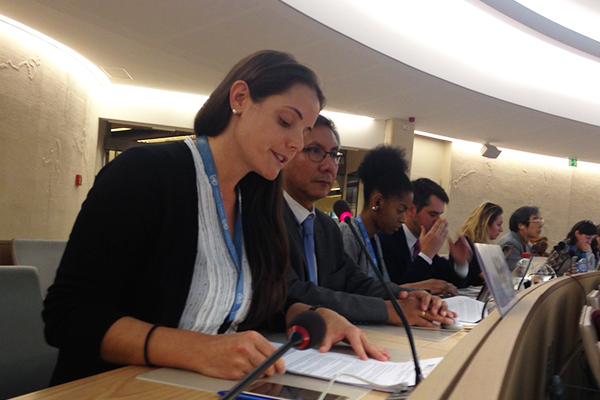
Business and human rights | Defenders should be included in binding treaty
A binding treaty on business and human rights must ensure that monitoring and implementation mechanisms meaningfully engage defenders, and categorically condemn reprisals against them, say international and regional human rights groups at the close of this week's meetings in Geneva.
Intervention by ISHR under Part 9, ‘Safe, inclusive and accessible mechanisms for promotion, implementation and monitoring’
Thank you, Mr Chair and esteemed panelists.
ISHR is pleased to deliver this statement on behalf of ourselves, Plataforma internacional, FIDH, Amnesty International, and CIEL.
We believe that robust consultation with human rights defenders, civil society groups and national human rights institutions will be essential to the successful promotion, implementation and monitoring of the treaty under negotiation here.
We would like to outline a few substantive points which we feel would strengthen the draft text before us.
First, the safety and security of any individual or group who seeks to advance the rights enshrined in the Treaty or to report on State efforts to implement the treaty is paramount. This Working Group should strive to ensure that the treaty contains language addressing the issue of reprisals for cooperation with the Committee, or other relevant UN bodies in respect of the Treaty. Models for this language include CAT (Art. 13), and more recently, OP-ICESCR (Art. 13) and OP-CRC-IC (Art. 4(1)). The latter states, for example:
A State party shall take all appropriate steps to ensure that individuals under its jurisdiction are not subjected to any human rights violation, ill-treatment or intimidation as a consequence of communications or cooperation with the Committee pursuant to the present Protocol.
The OP-CAT (Art. 15) similarly states that:
No authority or official shall order, apply, permit or tolerate any sanction against any person or organization for having communicated to the Subcommittee on Prevention or to its delegates any information, whether true or false, and no such person or organization shall be otherwise prejudiced in any way.
While respecting the need for independence, we would encourage this language to be implemented by the Committee through adoption of rules of procedures and working methods in line with system-wide guidance, such as the San José Guidelines.
To overlook the importance of including this language in the treaty is to under-represent the serious threats that are posed to human rights defenders doing the important work of holding accountable those responsible for business-related human rights violations and abuses.
Second, any future treaty should ensure the independence and expertise of members of its monitoring body for the effective review and implementation of State compliance.
This means that a Committee to monitor implementation of the treaty should be held to the highest standards for expertise and independence, as well as impartiality, as highlighted by the OHCHR. In this regard, any Committee formed under this treaty must be empowered to establish its own rules of procedure (as, for example, outlined in ICCPR Art. 39(9)), with particular regard for practices such as follow-up reporting and assessment.
Such a Committee should monitor those obligations specifically outlined in the treaty through periodic reporting, country visits, inquiry procedures and consideration of individual communications, which may address home or host governments. In the conduct of periodic reviews and the dissemination of observations, the role of civil society in informing any such treaty monitoring body is essential.
We note that the Human Rights Committee, Committee on the Rights of the Child, and most recently, Committee on Economic, Social and Cultural Rights have undertaken serious consideration of how States should implement obligations under their respective treaties in light of business operations, in close cooperation with the full range of stakeholders, including civil society. We urge that any Committee established by this Treaty would be complementary to, rather than duplicative of, this work.
To the panelists, and especially Mr Tuncak: how can the language in this section be strengthened to account for the complementary work of other UN human rights mechanisms, including the Special Procedures?
Finally, any treaty should call for States to adopt measures to ensure open, transparent and inclusive processes for monitoring compliance with the treaty, with the active participation of civil society and human rights defenders.
The OEIGWG should carefully consider and assess existing forms of national mechanisms for promotion, implementation and monitoring of treaty obligations. Some of the most recent UN human rights treaties, namely the OP-CAT and the CRPD, foresee the establishment of National Preventative Mechanisms and National Monitoring Mechanisms, respectively. And indeed, an increasing number of countries have established National Mechanisms for Reporting and Follow Up to facilitate national adaptation and implementation.
This may alternatively be a role designated for or delegated to a human rights Ombudsperson or an NHRI, on the condition that these institutions are credible and fully independent from both the government and corporations. For NHRIs in particular, we emphasise that this means A Status, and alignment with the Paris Principles.
Any mechanism should integrate the views of all relevant stakeholders, especially human rights defenders and affected communities. The CRPD, for example, highlights in Art. 33.3 that ‘civil society, in particular persons with disabilities and their representative organizations, shall be involved and participate fully in the monitoring process’. We urge the Working Group to consider similar language highlighting the role of defenders and affected communities in national implementation.
Thank you, Mr Chair.
Watch the statement here:
